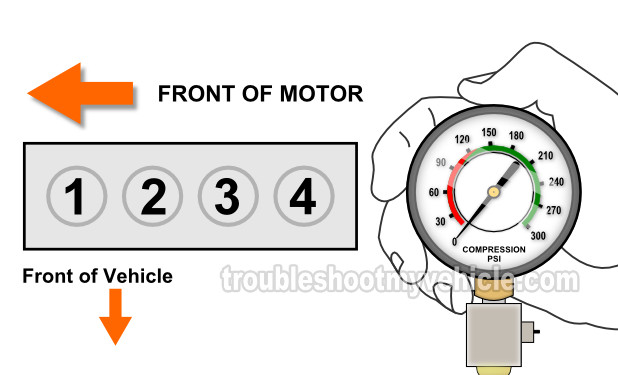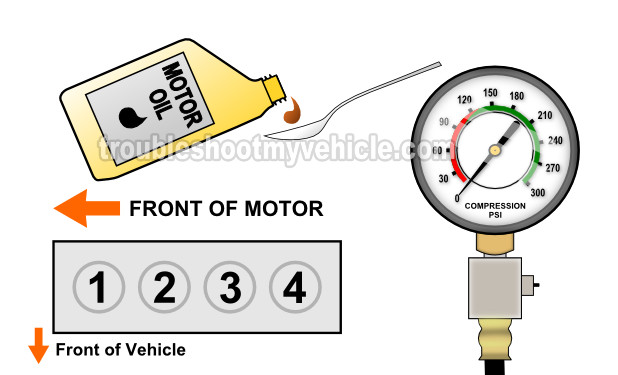
Testing engine compression is not hard and in this tutorial, I'll explain the test and how to interpret its results.
With your test results you'll be able to find out if an engine compression problem is causing a rough idle/misfire problem or a 'cranks but does not start' problem.
This tutorial covers the engine compression test on the Chrysler, Dodge, and Plymouth mini-vans equipped with the 2.4L 4 cylinder engine.
Contents of this tutorial:
ES ![]() You can find this tutorial in Spanish here: Cómo Probar La Compresión Del Motor (1996-2007 2.4L Chrysler, Dodge, Plymouth Mini-Van) (at: autotecnico-online.com).
You can find this tutorial in Spanish here: Cómo Probar La Compresión Del Motor (1996-2007 2.4L Chrysler, Dodge, Plymouth Mini-Van) (at: autotecnico-online.com).
APPLIES TO: This tutorial applies to the following mini-vans equipped with the 2.4L engine:
- 2.4L Chrysler Voyager: 2000, 2001, 2002, 2003.
- 2.4L Dodge Grand Caravan: 1996, 1997.
- 2.4L Dodge Caravan: 1996, 1997, 1998, 1999, 2000, 2001, 2002, 2003, 2004, 2005, 2006, 2007.
- 2.4L Plymouth Grand Voyager: 1996, 1997.
- 2.4L Plymouth Voyager: 1996, 1997, 1998, 1999, 2000.
CYLINDER MISFIRE DIAGNOSTICS:
- How To Troubleshoot A Cylinder Misfire (1996-2007 2.4L Chrysler, Dodge, And Plymouth Minivan).
- Common Causes Of Spark Plug Failure (1996-2007 2.4L Chrysler, Dodge, And Plymouth Minivan).
ENGINE NO-START DIAGNOSTICS:
Tools You'll Need:
- Compression gauge tester
- Engine oil
- A helper
- Pen and paper
Important Tips And Suggestions
TIP 1: Don't remove the spark plugs with a hot engine.
If your mini-van's engine has been running for any length of time, let it cool down completely before attempting to remove the spark plugs.
Why? Because you run the risk of damaging the spark plug hole threads (in the cylinder head) if the spark plugs are removed with a hot engine.
TIP 2: You'll need a helper to crank the engine for you, while you eye-ball the compression tester.
My suggestion to your helper wait outside the vehicle till you're done setting up the test. Once the test is done, ask you helper to wait outside again. This will help you to avoid having him or her accidentally crank the engine while you're setting up the test.
Symptoms Of Low Or No Engine Compression
I've noticed, over the years I've spent working as an automotive technician, that engine compression problems usually cause one of two issues.
Either the engine will suffer a rough idle/misfire condition or the engine is going to 'crank but not start' due to an engine compression problem.
To be a bit more specific, when one engine cylinder is affected with low or no engine compression, you'll feel a miss (misfire). This rough idle problem will usually cause the fuel injection computer to set a misfire trouble code:
- P0300: Random Cylinder Misfire.
- P0301: Cylinder #1 Misfire.
- P0302: Cylinder #2 Misfire.
- P0303: Cylinder #3 Misfire.
- P0304: Cylinder #4 Misfire.
Besides a misfire trouble code, you'll also see one or more of the following symptoms:
- Bad gas mileage.
- Rough idle that is only felt when the vehicle comes to a stop, but that disappears when the vehicle is accelerated.
- Blue smoke coming out of the exhaust pipe when the engine is running or is accelerated.
- Engine knocks when under load or when it's accelerated.
When a compression problem causes NO compression on 2 or more cylinders the engine is not going to start.
Now, hopefully you don't have any of the above conditions affecting the engine in your mini-van but there's only one way to find, so let's get testing.
Which Compression Tester Should I Buy?
There are lot of engine compression testers to choose from and many places to buy them. I'm gonna' make some recommendations to you:
Disclosure: As an Amazon Associate, I earn from qualifying purchases. If my tutorials help you, using these links is an easy way to support the site at no extra cost to you. Thank you!
TEST 1: Dry Engine Compression Test

The get the most accurate test result, from your compression test, it's important to test all 4 cylinders.
If you don't have a compression tester, you can run down to your local auto parts store (AutoZone, O'Reilly Auto Parts, etc.) and borrow one from them.
If you'd like to buy one and save a few bucks on its purchase, check out my recommendations here: Which Compression Tester Should I Buy?
These are the test steps:
- 1
Disconnect all 4 fuel injectors from their electrical connectors.
This may not be possible on all models (since some of the fuel injectors may be inaccessible due to the intake manifold plenum covering them). The next best thing is to remove the Auto Shut Down (ASD) Relay. This will also prevent fuel injectors from injecting fuel into the engine cylinders. This step is important! - 3
Disable the ignition system.
It's important that, while you're doing the test, no spark is fired from the spark plug wires. You can easily accomplish this by disconnecting the ignition coil pack. - 4
Remove all of the spark plugs.
Take care not to drop any of them, since dropping them can damage them and cause a misfire condition later. - 5
Thread the engine compression gauge into the spark plug hole for the number 1 engine cylinder (this is the spark plug hole closest to the drive belt).
Hand tighten the compression gauge only! Do not use any type of tool to get it tight. - 6
Have your helper crank up the engine.
Now the engine will not start (of course), but the idea is to crank the engine long enough to have the compression tester gauge's needle stop climbing. This usually takes about 10 seconds of cranking. - 7
When the needle stops moving (as the engine is being cranked), have your helper stop cranking the engine.
- 8
Write down this compression reading, along with the cylinder's number, on a piece of paper.
- 9
Repeat steps 5 thru' 7 on the rest of the cylinders.
Now, let's take a look at what your test results mean:
CASE 1: Your compression tester recorded NO compression on all cylinders. This isn't good and tells you that you have one of the following problems:
- Broken timing belt.
- Blown head gasket.
- Engine thru' a rod and is now junk.
CASE 2: Your compression tester recorded low or no compression on one or two cylinders. The next step is to interpret those numbers (compression numbers) you obtained from the tests. Go to: Interpreting The Results Of The Engine Compression Test.
Interpreting The Results Of The Engine Compression Test
Depending on the amount of wear and tear and mileage on your mini-van's engine, the compression values of the cylinders will not be uniform.
Up to a certain point, this will not cause any engine performance problems. But if the values vary more than 15% between each other, then you'll have an engine performance problem.
Finding out if the compression values are within a 'good' range is not difficult and in this section, I'll explain how to do it.
You can calculate this 15% difference with pen and paper or you can use my low compression calculator. You can find the low compression calculator here: Online Low Engine Compression Calculator (at: easyautodiagnostics.com).
If you want to manually calculate the 15% difference, here's what you'll need to do:
- STEP 1: Multiply the highest compression value by 0.15 (this is the decimal value of 15%).
- STEP 2: Round the result to the nearest one (for example: 25.6 would become 26).
- STEP 3: Subtract the result (the number that was rounded) from the highest compression value.
- ANSWER: The result of this subtraction is the lowest possible compression value any cylinder can have.
Now, let me give you a more specific example: Let's say that my engine compression test produced the following compression readings:
| Cylinder | Pressure |
|---|---|
| #1 | 165 PSI |
| #2 | 95 PSI |
| #3 | 155 PSI |
| #4 | 175 PSI |
My next step is to do the following calculation:
- STEP 1: 175 x 0.15 = 26.25.
- STEP 2: 26.25 = 26 (rounded to nearest one).
- STEP 3: 175 - 26 = 149.
- ANSWER: 149 PSI. Any cylinder with this compression (or lower) value will misfire.
Since cylinder #2 is only producing 95 PSI, I can now conclude that it's 'dead' and causing a misfire.
To find out if the lowest compression value you got from your engine compression test is within a good range, you'll need to do the same calculation. Of course, you'll need to use the highest compression value you got and not the one in the example.
Once you've found the 'dead' cylinder, the next step is to find out what's causing the low compression value. For this step, go to: TEST 2: Wet Engine Compression Test.
TEST 2: Wet Engine Compression Test

If in TEST 1 your compression test results indicate one or more cylinders will low or 0 PSI compression, then the next step is to perform a 'wet' compression test on them.
The 'wet' compression test simply involves adding about 2 tablespoons of engine oil to the cylinder with low compression and then retesting it with the compression gauge.
If the cylinder's compression value increases, then you can conclude that the compression problem is due to worn piston rings.
If the cylinder's compression value DOES NOT increase, then you can conclude that the compression problem is due to worn/damaged cylinder head valves.
Alright, lets get testing:
- 1
Add a small amount of engine oil to the cylinder that reported low compression or no compression in the 'dry' compression test
The amount should be about 1 to 2 tablespoons of oil. - 2
Install the compression tester onto the cylinder.
Do not use any type of tool to tightened the compression tester. Hand tight is fine. - 3
When all is set up, have your helper crank the engine.
- 4
You'll get one of two results:
1.) The compression value will go up (from the one you recorded before).
2.) The compression value will stay the same.
Let's take a look at what your test results mean:
CASE 1: The cylinder's compression value shot up. This confirms that the cylinder's low compression value is due to worn piston rings.
CASE 2: The cylinder's compression value stayed the same. This confirms that the cylinder's low compression value is due to worn or damaged cylinder head valves.

If this info saved the day, buy me a beer!




